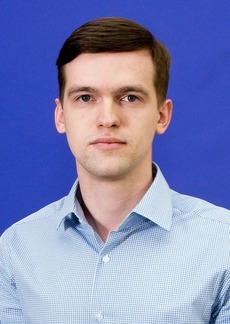Yuriy Shablya

Education
- • 2010 - 2015: Tomsk State University of Control Systems and Radioelectronics (TUSUR), major "Complex Information Security of Automated Systems".
- • 2015 - 2019: TUSUR, postgraduate study, major "Computer Science and Computer Engineering".
- • In 2019, he defended his dissertation for the degree of Candidate of Engineering Sciences.
Professional career
In 2015, Yuriy Shablya joined the team of Tomsk State University of Control Systems and Radioelectronics, becoming first a Programmer and then a Research Assistant at the Department of Complex Information Security of Computer Systems. At the same time, on internal secondary job, he worked first as an Assistant, then as a Lecturer at the Department of Complex Information Security of Computer Systems. In 2019, he defended his dissertation for the Candidate degree in the specialty "Theoretical foundations of computer science". Since 2021, he has been an Associate Professor at the Department of Complex Information Security of Computer Systems and, on internal secondary job, an Associate Professor at the Department of Economic Mathematics, Informatics and Statistics. Since 2022, he has been a Senior Research Officer of the Laboratory of Algorithms and Technologies for the Study of Discrete Structures (LATIDS).
Honorary titles and awards
- • Winner of the Tomsk Region Prize in education, science, health and culture in the nomination "Awards to full-time students of educational institutions of higher professional education" (2015)
- • Grant-aided student of the President of the Russian Federation to young scientists and graduate students engaged in promising research and development in priority areas of modernization of the Russian economy (2021-2023)
- • Winner in the competition "The best electronic course - 2022" in the nomination "The best electronic course in natural sciences" TUSUR (2023)
- • Winner in the competition "The best electronic course - 2023" in the nomination "The best electronic course in natural sciences" TUSUR (2024)
Scholarly endeavor
He develops new methods and algorithms of combinatorial generation for various kinds of combinatorial sets and their application to practical problems. He also explores the properties of compositions of generating functions and their degrees.
Participated in the implementation of scientific projects of the Russian Foundation for Basic Research (1 project as the head and 4 projects as the main contractor) and the Russian Science Foundation (2 projects as the main contractor).
Scientific and Methodological work
Yuriy Shablya develops electronic courses with active interaction with the student and the methodology of their application according to the technology of blended learning. He also develops automated training simulators in mathematical disciplines based on the use of STACK technology of the Moodle learning management system.
►Publications
- Combinatorial generation algorithms for directed lattice paths / Y.V. Shablya, A.A. Merinov, D.V. Kruchinin // Mathematics. – 2024. – Vol. 12, no 8. – Article ID 1207. – P. 1-18.
- Method for obtaining coefficients of powers of multivariate generating functions / D.V. Kruchinin, V.V. Kruchinin, Y.V. Shablya // Mathematics. – 2023. – Vol. 11, no 13. – Article ID 2859. – P. 1-15.
- Combinatorial generation algorithms for some lattice paths using the method based on AND/OR trees / Y.V. Shablya // Algorithms. – 2023. – Vol. 16, no 6. – Article ID 266. – P. 1-27.
- Unranking small combinations of a large set in co-lexicographic order / V.V. Kruchinin, Y.V. Shablya V.V. Kruchinin, V.M. Rulevskiy // Algorithms. – 2022. – Vol. 15(2), Article ID 36. – P. 1-10.
- On some properties of generalized Narayana numbers / D.V. Kruchinin, V.V. Kruchinin, Y.V. Shablya // Quaestiones Mathematicae. – 2022. – Vol. 45, no 12. – P. 1949-1963.
- Method for obtaining coefficients of powers of bivariate generating functions / D.V. Kruchinin, V.V. Kruchinin, Y.V. Shablya // Mathematics. – 2021. – Vol. 9(4), Article ID 428. – P. 1-17.
- New properties of a composition of ordinary generating functions for primes / Y.V. Shablya, D.V. Kruchinin, A.A. Shelupanov // Journal of Discrete Mathematical Sciences and Cryptography. – 2021. – Vol. 24, no 4. – P. 917-930.
- Method for developing combinatorial generation algorithms based on AND/OR trees and its application / Y.V. Shablya, D.V. Kruchinin, V.V. Kruchinin // Mathematics. – 2020. – Vol. 8(6), Article ID 962. – P. 1-21.
- Euler-Catalan’s number triangle and its application / Y.V. Shablya, D.V. Kruchinin // Symmetry. – 2020. – Vol. 12(4), Article ID 600. – P. 1-9.
- Properties of a composition of exponential and ordinary generating functions / D.V. Kruchinin, Y.V. Shablya, V.V. Kruchinin, A.A. Shelupanov // Communications in Mathematics and Applications. – 2018. – Vol. 9(4). – P. 705-711.
- Explicit formulas for Meixner polynomials / D.V. Kruchinin, Y.V. Shablya // International Journal of Mathematics and Mathematical Sciences. – 2015. – Vol. 2015, Article ID 620569. – P. 1-5.
Monographs
- Obtaining explicit formulas and identities for polynomials defined by generating functions of the form F(t)^x*G(t)^a / D.V. Kruchinin, V.V. Kruchinin, Y.V. Shablya // Polynomials – Theory and Application. – IntechOpen. – 2019. – P. 1-20.
- A method for obtaining explicit expressions of polynomials based on degrees of generating functions and its implementation / D.V. Kruchinin, V.V. Kruchinin, A.A. Shelupanov, Yu.V. Shablya, V.S. Melman / Tomsk: V-Spektr, 2017. – 172 p.
Study aids
- Game theory and operations research: Methodological guidelines for laboratory work / Yu.V. Shablya, D.V. Kruchinin, E.M. Davydova, A.A. Shelupanov // Tomsk: V-Spektr. – 2018. – 80 p.
Other positions:
-
Department of Economic Mathematics, Informatics and Statistics
Associate ProfessorAddress: Tomsk, 74 Vershinina Street, 422Phone: (3822) 90-01-87
Campus phone: 2811
Publications:
Elibrary (Elibrary AuthorID: 800664, Elibrary SPIN-код: 6354-4153)
Web of Science (Web of Science ResearcherID: A-7133-2018)
SCOPUS (SCOPUS AuthorID: 56939015600)
ORCID (ORCID ID: 0000-0002-9695-7493)
Google Scholar Citations (Google Scholar Citations User: xvFDiMsAAAAJ)